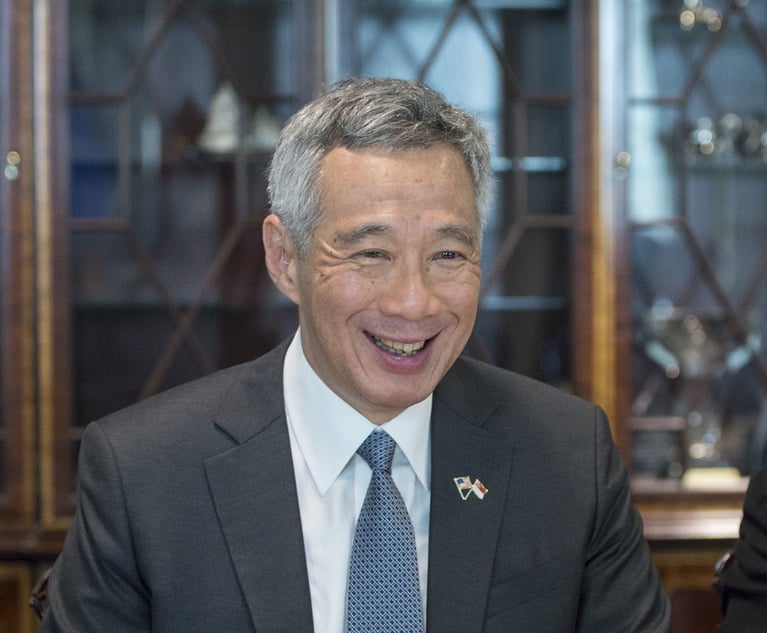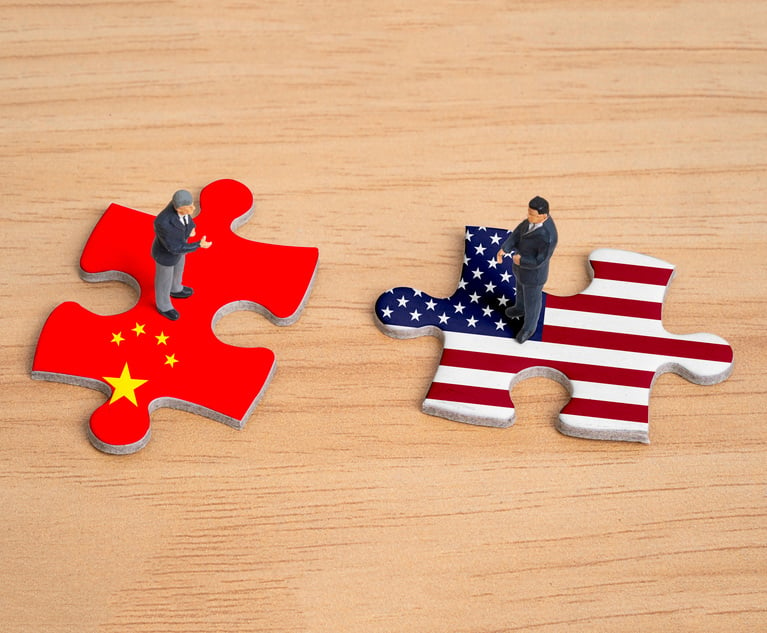Western firms with China ambitions urged to think creatively on billing
Western law firms need to think more creatively about which companies they target and how they bill in order to win work in China, according to partners at leading local firms Fangda and Jun He Law Offices.
April 19, 2012 at 07:00 PM
3 minute read
Chinese lawyers say UK advisers need to move beyond hourly billing to win state clients
Western law firms need to think more creatively about which companies they target and how they bill in order to win work in China, according to partners at leading local firms Fangda and Jun He Law Offices.
The suggestions were made during a presentation at Legal Week's Independent Law Firms Forum last month (22 March), chaired by former UBS chair Peter Kurer (pictured right), which also covered the rise of Chinese law firms in the international legal market.
Jonathan Zhou (pictured left), who has been a partner at Fangda Partners since 1994, warned that international law firms needed to be more flexible about how they were billing companies from mainland China for work, with larger state-owned companies in particular likely to be tough on fees.
"International firms shouldn't expect the largest companies to pay their normal fees – they're spoilt by all the firms trying to win work. A good client in terms of profile may not necessarily pay good fees," Zhou observed.
DingFa David Liu, a partner at Jun He, commented: "Some smart companies – especially if they can appreciate the added value lawyers provide – are willing to pay firms' prevailing hourly rates where a specific scope of work is spelled out. But generally Chinese clients are quite fee-conscious."
In particular, Chinese corporates often expect fixed or capped fee arrangements from legal advisers, with Liu warning that firms will find it almost impossible to recover their full fees if they are not honest and upfront about how long work is likely to take and the cost in advance.
Tight internal controls at state-owned enterprises are more likely to squeeze firms on pricing, though there may be opportunities for firms to receive greater volumes of work in return for reduced fees.
Despite growing trade between China and the West, international law firms lack clarity about what Chinese clients want in a legal adviser, according to Zhou. He pointed out that while many companies choose to go simply with the best-known UK and US law firms, the growing internationalisation of Chinese law firms, as typified by the King & Wood Mallesons deal, Fangda's forthcoming plans to open in Hong Kong and Zhong Lun W&D's alliance with 30-lawyer City firm DKLM, meant this was likely to change.
This could create opportunities both for Chinese law firms and for smaller Western firms with offices in the region, or forging links with local firms.
Zhou commented: "It is true that some Chinese firms are starting to look abroad, and London is one of the targeted cities. However, different firms have different strategies, and we are still only in the early stages of exposure to the international market.
"It is hard to say which strategies will prove successful as there are always challenges ahead – cultural, linguistic and impact on profitability."
This content has been archived. It is available through our partners, LexisNexis® and Bloomberg Law.
To view this content, please continue to their sites.
Not a Lexis Subscriber?
Subscribe Now
Not a Bloomberg Law Subscriber?
Subscribe Now
NOT FOR REPRINT
© 2025 ALM Global, LLC, All Rights Reserved. Request academic re-use from www.copyright.com. All other uses, submit a request to [email protected]. For more information visit Asset & Logo Licensing.
You Might Like
View All
Singapore Leaders Stress the Importance of the Rule of Law Amid Geopolitical Tensions

Can Law Firms Avoid Landing on the 'Enemy' List During the Trump Administration?
5 minute read

Letter From Asia: Will Big Law Ever Bother to Understand Asia Again?
Trending Stories
- 1South Florida Attorney Charged With Aggravated Battery After Incident in Prime Rib Line
- 2'A Death Sentence for TikTok'?: Litigators and Experts Weigh Impact of Potential Ban on Creators and Data Privacy
- 3Bribery Case Against Former Lt. Gov. Brian Benjamin Is Dropped
- 4‘Extremely Disturbing’: AI Firms Face Class Action by ‘Taskers’ Exposed to Traumatic Content
- 5State Appeals Court Revives BraunHagey Lawsuit Alleging $4.2M Unlawful Wire to China
Who Got The Work
J. Brugh Lower of Gibbons has entered an appearance for industrial equipment supplier Devco Corporation in a pending trademark infringement lawsuit. The suit, accusing the defendant of selling knock-off Graco products, was filed Dec. 18 in New Jersey District Court by Rivkin Radler on behalf of Graco Inc. and Graco Minnesota. The case, assigned to U.S. District Judge Zahid N. Quraishi, is 3:24-cv-11294, Graco Inc. et al v. Devco Corporation.
Who Got The Work
Rebecca Maller-Stein and Kent A. Yalowitz of Arnold & Porter Kaye Scholer have entered their appearances for Hanaco Venture Capital and its executives, Lior Prosor and David Frankel, in a pending securities lawsuit. The action, filed on Dec. 24 in New York Southern District Court by Zell, Aron & Co. on behalf of Goldeneye Advisors, accuses the defendants of negligently and fraudulently managing the plaintiff's $1 million investment. The case, assigned to U.S. District Judge Vernon S. Broderick, is 1:24-cv-09918, Goldeneye Advisors, LLC v. Hanaco Venture Capital, Ltd. et al.
Who Got The Work
Attorneys from A&O Shearman has stepped in as defense counsel for Toronto-Dominion Bank and other defendants in a pending securities class action. The suit, filed Dec. 11 in New York Southern District Court by Bleichmar Fonti & Auld, accuses the defendants of concealing the bank's 'pervasive' deficiencies in regards to its compliance with the Bank Secrecy Act and the quality of its anti-money laundering controls. The case, assigned to U.S. District Judge Arun Subramanian, is 1:24-cv-09445, Gonzalez v. The Toronto-Dominion Bank et al.
Who Got The Work
Crown Castle International, a Pennsylvania company providing shared communications infrastructure, has turned to Luke D. Wolf of Gordon Rees Scully Mansukhani to fend off a pending breach-of-contract lawsuit. The court action, filed Nov. 25 in Michigan Eastern District Court by Hooper Hathaway PC on behalf of The Town Residences LLC, accuses Crown Castle of failing to transfer approximately $30,000 in utility payments from T-Mobile in breach of a roof-top lease and assignment agreement. The case, assigned to U.S. District Judge Susan K. Declercq, is 2:24-cv-13131, The Town Residences LLC v. T-Mobile US, Inc. et al.
Who Got The Work
Wilfred P. Coronato and Daniel M. Schwartz of McCarter & English have stepped in as defense counsel to Electrolux Home Products Inc. in a pending product liability lawsuit. The court action, filed Nov. 26 in New York Eastern District Court by Poulos Lopiccolo PC and Nagel Rice LLP on behalf of David Stern, alleges that the defendant's refrigerators’ drawers and shelving repeatedly break and fall apart within months after purchase. The case, assigned to U.S. District Judge Joan M. Azrack, is 2:24-cv-08204, Stern v. Electrolux Home Products, Inc.
Featured Firms
Law Offices of Gary Martin Hays & Associates, P.C.
(470) 294-1674
Law Offices of Mark E. Salomone
(857) 444-6468
Smith & Hassler
(713) 739-1250








